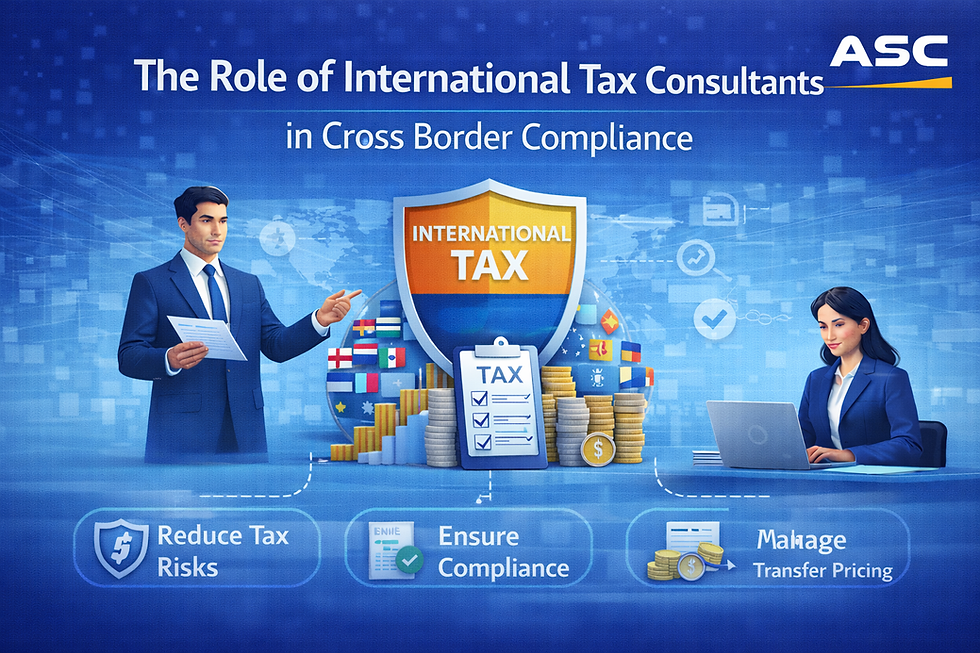How EPR Registration Consultants Accelerate Certificate Approval for Importers in India
- ASC Group
- Nov 18, 2025
- 3 min read
India’s environmental compliance requirements have become significantly stricter in recent years, especially for businesses involved in importing plastic, electronic goods, batteries, and packaging materials. One of the most crucial compliance obligations is EPR Registration, which ensures that producers, importers, and brand owners take responsibility for the waste generated from their products.
However, obtaining an EPR Certificate for Import is not always straightforward. The Central Pollution Control Board (CPCB) process involves multiple stages, technical documentation, fee structures, and strict scrutiny. This is where a professional EPR Registration Consultant becomes essential — helping importers accelerate approvals and avoid compliance hurdles.
This blog explains why importers need expert assistance, the challenges they commonly face, and how EPR consultants streamline the end-to-end approval process.
What Is EPR Registration and Why Do Importers Need It?
EPR (Extended Producer Responsibility) is a mandatory compliance requirement under India’s Plastic Waste Management, E-Waste Management, and Battery Waste Management Rules. It requires every importer to take responsibility for environmentally safe collection, recycling, and disposal of the waste generated from their imported products.
Importers must obtain an EPR Certificate when they:
Import electronics & electrical equipment
Import plastic-packaged goods
Import batteries or battery-operated equipment
Import plastic raw materials or finished plastic products
Import products generating waste regulated under CPCB norms
Why EPR Authorization matters:
Mandatory for customs clearance
Required for legal selling and distribution in India
Prevents environmental penalties and compliance violations
Ensures the importer contributes to sustainable waste management
Without proper EPR License for Import, consignments may be delayed, blocked, or rejected at customs.
Why Importers Struggle With EPR Registration
Although CPCB provides an online portal for EPR Registration, the approval process involves multiple technical and regulatory steps that often confuse businesses.
Common challenges include:
Confusion about applicable EPR category (E-waste, plastic, battery, etc.)
Incorrect or incomplete documentation
Difficulty understanding CPCB compliance guidelines
Delays due to portal errors or technical queries
Lack of clarity regarding EPR Registration fees and obligations
Non-alignment of recycling commitments with CPCB expectations
Because EPR applications are reviewed manually by CPCB officials, even minor errors can lead to rejections or extended delays.
How EPR Registration Consultants Help Importers
Professional EPR Consultants play a crucial role in simplifying the entire EPR Registration process, ensuring faster approvals and complete compliance.
Here’s how they accelerate approval timelines:
1. Accurate Category Identification and Compliance Mapping
Consultants analyze the importer’s products and determine:
Applicable EPR category
Required documentation
CPCB reporting responsibilities
Recycling obligations
This ensures the importer begins the application on the correct compliance track.
2. Complete Documentation Preparation
EPR approvals depend heavily on documentation quality. Consultants prepare and verify:
Product details
Import data and declarations
Authorized signatory documents
Business licenses
Packaging & material specifications
Waste management plans
This eliminates errors that commonly cause delays.
3. Portal Filing & End-to-End Submission
Experts manage the full EPR Registration Online process:
Portal login creation
Application submission
Form filling
Document uploads
Fee calculation
Their experience ensures the application is submitted in line with CPCB expectations.
4. Coordination With CPCB for Faster Approval
One of the biggest advantages of hiring EPR Certificate Consultants is their ability to:
Respond quickly to CPCB queries
Resolve technical objections
Track application movement
Ensure timely approval
This reduces waiting time and prevents unnecessary back-and-forth communication.
5. Assistance in Recycling Partnerships & Annual Reporting
EPR License holders must maintain recycling obligations every year.
Consultants assist with:
Selecting CPCB-approved recyclers
Drafting EPR fulfilment plans
Ensuring recycling certificates match annual targets
Preparing annual EPR compliance reports
This ensures the importer stays compliant long after obtaining the certificate.
Why ASC Group Is a Trusted EPR Registration Consultant in India
ASC Group is a leading compliance advisory firm offering professional support for EPR Certificate Online, EPR Authorization, and EPR Registration for Import.
Why importers choose ASC Group:
Years of experience with CPCB documentation and approvals
Accurate compliance mapping to avoid rejections
End-to-end portal management and filing
Fast response to CPCB queries for quicker approvals
Assistance with recycling partners and annual compliance
Transparent process and dedicated consulting team
ASC Group ensures that businesses obtain their EPR License smoothly and maintain full compliance without stress or delays.
Conclusion
EPR Registration is no longer optional — it is a mandatory and critical step for every importer entering the Indian market. However, the technical nature of CPCB registration, documentation requirements, and compliance responsibilities make the process challenging for businesses handling imports.
Professional EPR Registration Consultants bring clarity, expertise, and speed to the entire process. By guiding importers through each step, avoiding errors, and coordinating with CPCB for faster approvals, they ensure that businesses remain compliant and operational without disruption.
With ASC Group’s end-to-end support, importers can secure their EPR Certificate for Import confidently, quickly, and hassle-free.




Comments